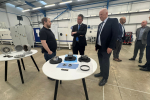
Covid 19 continues to disrupt all our lives, but we are seeing a remarkable response to it from so many parts of our society and our public services. We rightly clap for carers on Thursday evenings and every day we thank those who keep us safe, fed and defended from the virus but, difficult as it is for many, the best thing we can all do to help to bring this period to the soonest possible end is to comply with the restrictions and to stay at home wherever possible. Doing so obliges us to work differently and that is true for MPs too. You may have heard that MPs have been allocated more money to facilitate home working. To reassure you, this is not additional salary but an increased office budget to allow my staff to continue working from home and provide the best service we can to constituents during this difficult time. I will claim no more than I need to do that.
Life has to change because of Covid 19, but it cannot stop altogether. Deciding what should be paused and what should be continued is not easy, including on some of the largest projects underway in our area. The arguments against HS2 have been made over the last 10 years and you will be aware of my consistent view that HS2 is not the best way to deliver a high speed rail network in the UK. However, HS2 has had repeated and substantial Parliamentary support and Phase 1 of the project, which affects our area, now has legislative authority to proceed. The Government has considered recently whether to continue with the project and has decided that it should. HS2 has survived legal challenges, against its continuation generally and against work in ancient woodlands specifically. There is, therefore, no reason to believe HS2 will not now be built.
The current outbreak of Covid 19 has raised the legitimate question of whether work on HS2 should be paused as a consequence of the measures being taken to restrict the spread of infection (those measures do not of course provide an argument for the cancellation of the project altogether), and I understand the instinct of those who oppose HS2 to make use of that argument, but I do not think this is a straightforward judgment.
In seeking to reduce the spread and speed of infection, the Government has sought to strike a difficult balance between taking the measures necessary for public health and allowing the economy to continue functioning, so that wages can still be earned where that is consistent with necessary restrictions and taxes paid to fund the health and other public services we need more than ever. It has acted throughout on the basis of expert medical and scientific advice. It is not currently the case that the only economic activity permitted is that which can be defined as essential or meeting an emergency need. There is no reason to treat businesses working on HS2 any differently in this respect to businesses working on other construction projects or in other (non essential or emergency) sectors of the economy. I think it follows that work on HS2 should cease if it cannot be carried out in accordance with Government restrictions on workplaces, workers and ways of working (including regarding precautions taken in contact with local communities), but also that if work can be continued consistently with those restrictions, then there is no other Government order that should currently prevent it. I would add 2 further provisos. First, it will be essential that all HS2 works involving road closures recognise and accommodate the need to allow swift ongoing access for emergency services, particularly ambulances. Second, that breaches of Government restrictions at HS2 sites are reported and acted upon and that HS2 employees or contractors who are concerned feel able to speak about their concerns, including with their Members of Parliament, like anyone else.
If (and only if) work on HS2 can be carried out in accordance with Government restrictions, it seems to me there are other arguments in favour of it continuing now. I have no doubt that the construction of HS2 will be far more disruptive, to far more of my constituents, than the operation of the railway when it is complete. If HS2 is to happen therefore, I believe it is in the interests of my constituents that the construction phase is completed as soon as possible. Delays in completing construction will simply extend the period of upset and inconvenience that those works will cause and extend the period of uncertainty and blight for those seeking to sell houses or run businesses near to the line of route. It also seems to me that, if it can be done safely, it is sensible to make use of a period where most of us are restricted in our use of the roads to carry out works which will involve road closures or other disruption to travel.
If restrictions become more stringent, the continuing of works for HS2 will have to be revisited.
For those who face economic uncertainty, including those who run their own businesses, this is a particularly difficult time. The help on offer from national and local government is developing all the time, as it needs to, and you can find information on government help at https://www.gov.uk/coronavirus and local council and business organisation help at https://www.jeremywright.org.uk/news/local-council-support where I have provided links to all the local councils across my constituency. For those who are deemed as extremely clinically vulnerable and worried about getting food and medicine, it is also worth looking at the help available from Warwickshire County Council at https://www.warwickshire.gov.uk/coronavirus. My team and I will also continue to connect you to those who can help where we can, or argue for improvements to the help available where there are gaps that need to be filled.

